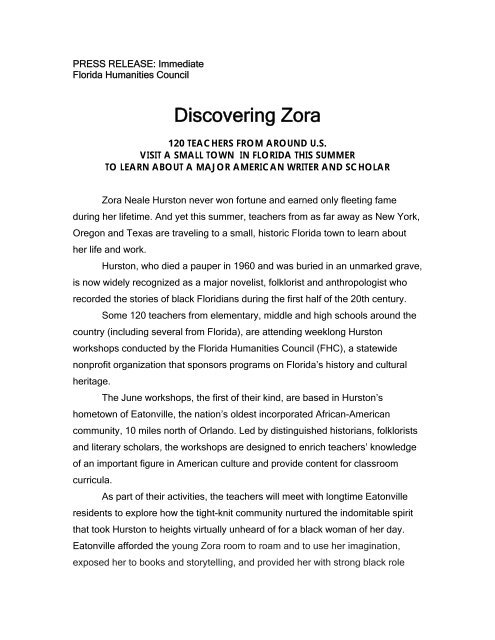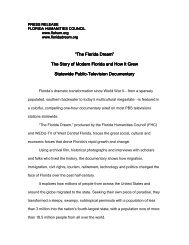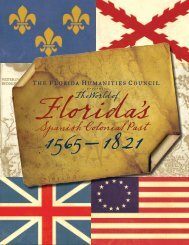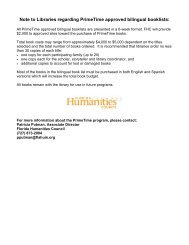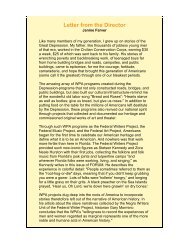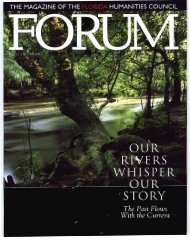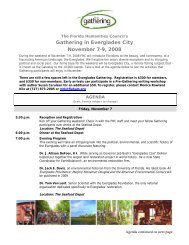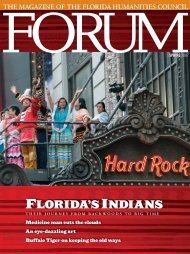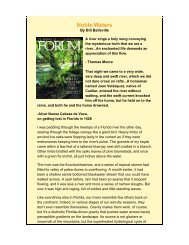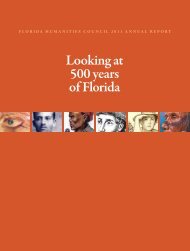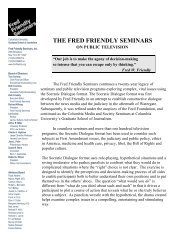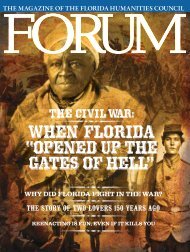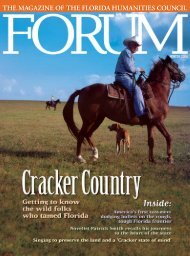DISCOVERING ZORA - Florida Humanities Council
DISCOVERING ZORA - Florida Humanities Council
DISCOVERING ZORA - Florida Humanities Council
Create successful ePaper yourself
Turn your PDF publications into a flip-book with our unique Google optimized e-Paper software.
PRESS RELEASE: Immediate<br />
<strong>Florida</strong> <strong>Humanities</strong> <strong>Council</strong><br />
Discovering Zora<br />
120 TEACHERS FROM AROUND U.S.<br />
VISIT A SMALL TOWN IN FLORIDA THIS SUMMER<br />
TO LEARN ABOUT A MAJOR AMERICAN WRITER AND SCHOLAR<br />
Zora Neale Hurston never won fortune and earned only fleeting fame<br />
during her lifetime. And yet this summer, teachers from as far away as New York,<br />
Oregon and Texas are traveling to a small, historic <strong>Florida</strong> town to learn about<br />
her life and work.<br />
Hurston, who died a pauper in 1960 and was buried in an unmarked grave,<br />
is now widely recognized as a major novelist, folklorist and anthropologist who<br />
recorded the stories of black Floridians during the first half of the 20th century.<br />
Some 120 teachers from elementary, middle and high schools around the<br />
country (including several from <strong>Florida</strong>), are attending weeklong Hurston<br />
workshops conducted by the <strong>Florida</strong> <strong>Humanities</strong> <strong>Council</strong> (FHC), a statewide<br />
nonprofit organization that sponsors programs on <strong>Florida</strong>’s history and cultural<br />
heritage.<br />
The June workshops, the first of their kind, are based in Hurston’s<br />
hometown of Eatonville, the nation’s oldest incorporated African-American<br />
community, 10 miles north of Orlando. Led by distinguished historians, folklorists<br />
and literary scholars, the workshops are designed to enrich teachers’ knowledge<br />
of an important figure in American culture and provide content for classroom<br />
curricula.<br />
As part of their activities, the teachers will meet with longtime Eatonville<br />
residents to explore how the tight-knit community nurtured the indomitable spirit<br />
that took Hurston to heights virtually unheard of for a black woman of her day.<br />
Eatonville afforded the young Zora room to roam and to use her imagination,<br />
exposed her to books and storytelling, and provided her with strong black role
models—and with much material for her books. In Eatonville, she was encouraged<br />
to achieve.<br />
“Jump at de sun,” Hurston’s mother told the young Zora and her siblings.<br />
“We might not land on the sun, but at least we would get off the ground.”<br />
Hurston went on to graduate from the prestigious Barnard College and<br />
become one of the leading lights of the Harlem Renaissance, the New Yorkbased<br />
African-American cultural movement that blossomed in the 1920s.<br />
During a career that stretched over more than 30 years, Hurston emerged<br />
as a powerful literary presence, publishing four novels, two books of folklore, an<br />
autobiography, numerous short stories, and several essays, articles and plays.<br />
Her masterwork is considered to be the 1937 novel “Their Eyes Were Watching<br />
God,” which was adapted for a television movie in 2005 by Oprah Winfrey’s<br />
Harpo Productions.<br />
Hurston biographer Valerie Boyd, one of the scholars speaking at the<br />
workshops, writes that Eatonville’s special qualities were key to Hurston’s later<br />
successes.<br />
“Essentially everything that Zora Hurston would grow up to write, and to<br />
believe, had its genesis in Eatonville,” Boyd writes in “Wrapped in Rainbows.”<br />
“Anywhere Zora looked, she could see the evidence of black achievement. She<br />
could look toward town hall and see black men, including her father, formulating<br />
the laws that governed Eatonville. She could look to the Sunday schools of both<br />
the town’s churches and see black women, including her mother, directing the<br />
Christian curricula. She could look to the porch of the store owned by Eatonville<br />
founder Joe Clarke and see black men and women passing worlds through their<br />
mouths in the form of colorful, engaging stories.”<br />
Many of these stories made their way into her novels and collections of<br />
folklore. Hurston, trained as an anthropologist at Barnard, collected African-<br />
American folklore and folk songs in <strong>Florida</strong> for the Depression-era Federal<br />
Writers Project, a program of the U.S. Works Progress Administration. (Much of<br />
this material is available online through the U.S. Library of Congress website,<br />
“<strong>Florida</strong> Folklife from the WPA Collections.”)<br />
The teachers at the <strong>Florida</strong> workshops are researching Hurston
documents archived at Rollins College in nearby Winter Park. They are also<br />
seeing Chautauqua-style portrayals of Hurston and attending theatrical<br />
presentations featuring the songs and stories that Hurston collected during the<br />
1930s in Central <strong>Florida</strong>.<br />
These on-site workshops are funded by a grant of nearly $200,000 from<br />
the National Endowment for the <strong>Humanities</strong>, FHC’s affiliate organization. FHC’s<br />
previous on-site workshops funded with major NEH grants were held over the<br />
past four summers in St. Augustine. Those workshops, titled “Between Columbus<br />
and Jamestown: Spanish St. Augustine,” were attended by nearly 700 teachers<br />
from across <strong>Florida</strong> and the United States. In total, these FHC workshops have<br />
brought more than $1 million in federal funds to <strong>Florida</strong> to educate teachers about<br />
<strong>Florida</strong>’s special heritage.<br />
Joining FHC as cosponsors of the Hurston workshops are Rollins College<br />
and the Association to Preserve the Eatonville Community. Rollins will house the<br />
teachers.<br />
Although Hurston was a prolific and gifted writer, she fell on hard times in<br />
the 1940s. After World War II she was a virtual unknown, working odd jobs until<br />
her health failed. She had a stroke and died penniless in 1960 at age 69 in Fort<br />
Pierce, on <strong>Florida</strong>’s East Coast, where she had been working as a substitute<br />
teacher. Friends took up a collection to pay for her funeral, but her grave<br />
remained unmarked until 1973 when a young writer named Alice Walker<br />
searched it out.<br />
Walker, author of the celebrated novel “The Color Purple,” wrote an essay<br />
in 1975 that sparked a rediscovery of Hurston. The cities of Eatonville and Fort<br />
Pierce began holding annual festivals and other events celebrating Hurston’s life<br />
and work. Scholars and cultural organizations rediscovered Hurston and placed<br />
her work beside that of top-tier American writers. In 2003 the U.S. Postal Service<br />
featured Hurston’s portrait on a postage stamp, praising her as one who<br />
represents “the very best of America’s cultural heritage.”<br />
Teachers at the FHC workshops are traveling to Fort Pierce to visit<br />
Hurston’s gravesite, now marked with a tombstone purchased by novelist Walker.<br />
The plain, gray marker is inscribed:
Zora Neale Hurston: A Genius of the South.<br />
To learn more about the <strong>Florida</strong> <strong>Humanities</strong> <strong>Council</strong>, visit www.flahum.org.<br />
Contact:<br />
Barbara O'Reilley<br />
Communications Director<br />
<strong>Florida</strong> <strong>Humanities</strong> <strong>Council</strong><br />
599 2nd Street South<br />
St. Petersburg, FL 33701-5005<br />
ph: (727) 873-2012<br />
fax: (727) 873-2014<br />
email: boreilley@flahum.org<br />
web: www.flahum.org


